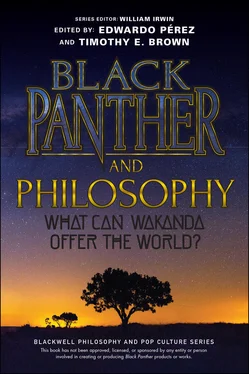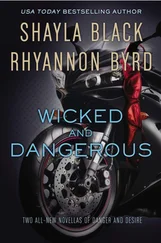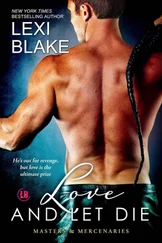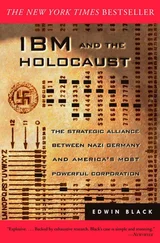Black Panther and Philosophy
Здесь есть возможность читать онлайн «Black Panther and Philosophy» — ознакомительный отрывок электронной книги совершенно бесплатно, а после прочтения отрывка купить полную версию. В некоторых случаях можно слушать аудио, скачать через торрент в формате fb2 и присутствует краткое содержание. Жанр: unrecognised, на английском языке. Описание произведения, (предисловие) а так же отзывы посетителей доступны на портале библиотеки ЛибКат.
- Название:Black Panther and Philosophy
- Автор:
- Жанр:
- Год:неизвестен
- ISBN:нет данных
- Рейтинг книги:4 / 5. Голосов: 1
-
Избранное:Добавить в избранное
- Отзывы:
-
Ваша оценка:
- 80
- 1
- 2
- 3
- 4
- 5
Black Panther and Philosophy: краткое содержание, описание и аннотация
Предлагаем к чтению аннотацию, описание, краткое содержание или предисловие (зависит от того, что написал сам автор книги «Black Panther and Philosophy»). Если вы не нашли необходимую информацию о книге — напишите в комментариях, мы постараемся отыскать её.
Black Panther and Philosophy: What Can Wakanda Offer The World
Black Panther
Black Panther and Philosophy
Black Panther and Philosophy — читать онлайн ознакомительный отрывок
Ниже представлен текст книги, разбитый по страницам. Система сохранения места последней прочитанной страницы, позволяет с удобством читать онлайн бесплатно книгу «Black Panther and Philosophy», без необходимости каждый раз заново искать на чём Вы остановились. Поставьте закладку, и сможете в любой момент перейти на страницу, на которой закончили чтение.
Интервал:
Закладка:
Burke might have predicted all of this. The division sewn by Killmonger’s effort to single-handedly reshape Wakandan society; the civil war; the willingness of some to shed the blood of their fellow citizens; the restoration of peace through a reassertion of tradition – each of these things is evidence of the danger of revolution that Burke warned against and the value that he saw in tradition.
None of this means that Wakanda has to remain “stuck in the past,” however. Far from it. In fact, T’Challa does begin to reform his country after he defeats Killmonger and resumes his place as king. Having seen that Wakanda could use its resources to help the rest of the world – “the world we wish to join,” as T’Chaka says in Captain America: Civil War – he begins establishing outreach centers in other countries. It isn’t the radical course reversal that revolutionaries like Killmonger and W’Kabi wanted, of course, but the incrementalist approach allows Wakanda to grow without subjecting itself to the dangerous turmoil that rapid change causes. It represents the kind of organic development that Burke thought was healthy for nations, and allows the reclusive nation to reform and open up to the world without losing its true identity.
Wakanda forever!
Notes
1 1. Edmund Burke, An Appeal from the New to the Old Whigs, In Consequence of Some Late Discussions in Parliament, Relative to the Reflections on the French Revolution, 4th ed. (London: J. Dodsley, 1791), 472.
2 2. Edmund Burke, Reflections on the Revolution in France, in Francis Canavan ed., Selected Works of Edmund Burke, vol. 2 (Indianapolis: Liberty Fund, 1999), 122.
3 3. Edmund Burke, Observations on the Late State of the Nation, in Paul Langford ed., The Writings of Edmund Burke, vol. 2 (London: Clarendon Press, 1981), 196.
4 4. Burke (1999), 121.
2 Transforming Wakanda Justice (or Not?) in Black Panther
Steve Bein and Deana Lewis
Suppose the epic battle at the end of the film Black Panther took a different turn. T’Challa still delivers the final blow to Killmonger, but after a life-saving surgery, Killmonger wakes up to find himself handcuffed to a hospital bed. He still gets to deliver that killer line about death being better than bondage, but T’Challa replies with a sad smile. “I know the legal system you grew up with is designed for retribution,” he says, “but Wakandan justice is more civilized. You’ll see.”
Does justice demand letting a mass murderer like Erik Killmonger bleed to death? If he doesn’t die, what does justice demand then? That depends not only on how you define justice but also on what kind of justice you’re trying to define. The question of what punishment Killmonger deserves is quite different from the question of how to repair the harm he’s done, which again is quite different from the question of how to right the wrongs done to him. Philosophers have dedicated countless pages to these kinds of questions, and they’ve outlined a whole taxonomy of different kinds of justice. In this chapter we’ll look at two of the classical conceptions of justice and then examine the contemporary movements that arose to challenge these old concepts. But first, let’s look at Wakanda’s record on justice.
Wakanda Forever?
On its surface, Wakanda appears to be a utopia: beautiful, pristine, devoid of poverty, a land where the world’s most educated people care for each other using the world’s most advanced technology. Monarchy isn’t what you’d call a fair system of government, but as monarchies go, Wakanda’s is better than most. A Black Panther is made, not born; anyone can challenge for the right to rule. Monarchy and meritocracy aren’t usually compatible, but somehow Wakanda found a way.
Sort of. In the comics, the trial to become the Black Panther involves more than fighting, but ritual combat has always been the final and most glamorous test in Wakanda. Pacifists need not apply. Also, while strife between the five Wakandan tribes is a long-running theme, solutions for this conflict have never been pretty. The Jabari Tribe is basically Wakanda’s Tibet, cast into the mountainous hinterlands because of its religious beliefs. And the Dora Milaje weren’t originally an elite security unit. Instead, each tribe sent a teenage girl to the Black Panther as a ceremonial wife-in-training, with the idea that any tribe might theoretically wed itself to royalty. 1Hence their name, “the Adored Ones.” Training them to be badasses doesn’t offset the fact that they’re political pawns.
Wakanda is even worse on foreign policy. Of course, a fictional country can do nothing to aid its real-world neighbors, but within the world of the comics, Wakanda has a lot to answer for. It ignored every crisis that scourged central Africa: colonialism, the slave trade, drought, famine, HIV, ethnocide, and the list goes on. So, if T’Challa wants Wakandan justice to be “more civilized,” he’s got a lot of work to do. 2
Justice and Retribution
Now what should Wakanda do with Killmonger? Immanuel Kant (1724–1804), an enormously influential philosopher on the subject of justice, would say the first concern is that Wakanda must not use him merely as a means for its own ends. That is, it can’t punish him to make the country safer. If it plans to imprison him – or execute him, or fine him, or let him bleed out after a knife fight with the king – it has to be because he deserves it, not because it will benefit anyone else.
What we’re talking about here is retributive justice , the kind of justice that’s concerned with punishment rather than rehabilitation. Killmonger has too many misdeeds to count, so let’s focus on the one we opened this chapter with, the one that leads up to the climactic showdown in Black Panther : T’Challa isn’t dead and he didn’t yield, yet Killmonger refuses to give up the throne. What would Kant say to this?
In good Kantian fashion, his answer is anything but obvious. (In the average college-level ethics class, Kant is usually the hardest philosopher to understand.) On the one hand, Kant says your duty to obey your ruler has nothing to do with how your ruler came to power. 3That sounds like Killmonger deserves no punishment at all. In fact, it sounds like T’Challa is the one who deserves punishment, because the throne is rightfully Killmonger’s as soon as he takes it. On the other hand, if it really doesn’t matter how the ruler comes to power, then usurping the throne is exactly as legitimate as being presumed dead after being thrown off of Warrior Falls and then clinging to life long enough for your sister to schlep a Heart-Shaped Herb halfway across the country instead of just drinking it herself and becoming the ass-kicker she is in the comics. 4
Regardless of whether it’s T’Challa or Killmonger who has the stronger claim to the throne, the other guy deserves punishment, and Kant would almost certainly say the just punishment for him is execution. Why? For one thing, Kant was an avid fan of the death penalty, advocating it even for crimes as trivial as adultery. 5For another, he thought physical violence was the correct tool to use when dealing with Black people. In fact, Kant said they aren’t capable of moral reasoning on their own, but if you want them to behave morally an effective method is to beat them. (We aren’t making this up. 6) And if you think that’s bad, don’t forget, when it comes to justice, Kant is still one of the most influential figures in all of Western philosophy.
So yeah, maybe Kant isn’t the best person to ask. Let’s try John Locke (1632–1704), who would say what Killmonger deserves goes well beyond the question of punishment. There’s also the question of what he’s owed.
Читать дальшеИнтервал:
Закладка:
Похожие книги на «Black Panther and Philosophy»
Представляем Вашему вниманию похожие книги на «Black Panther and Philosophy» списком для выбора. Мы отобрали схожую по названию и смыслу литературу в надежде предоставить читателям больше вариантов отыскать новые, интересные, ещё непрочитанные произведения.
Обсуждение, отзывы о книге «Black Panther and Philosophy» и просто собственные мнения читателей. Оставьте ваши комментарии, напишите, что Вы думаете о произведении, его смысле или главных героях. Укажите что конкретно понравилось, а что нет, и почему Вы так считаете.












